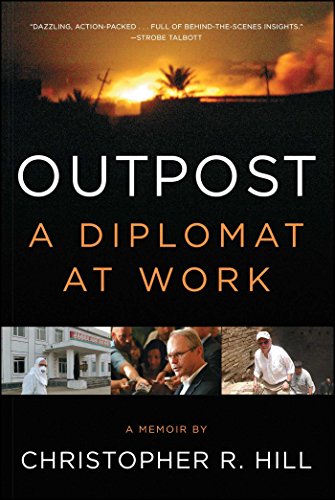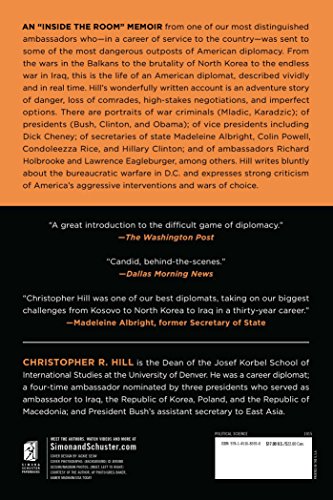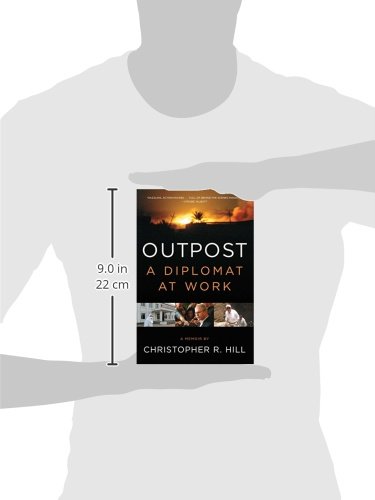Customer Services
Copyright © 2025 Desertcart Holdings Limited
Desert Online General Trading LLC
Dubai, United Arab Emirates




Full description not available
J**A
A must-read if you're interested in the Foreign Service
Christopher R. Hill is an inspiration for many aspiring Foreign Service Officers; his 33 year resume is pretty close to ideal. Ambassador Sung Kim (the Philippines) listed Hill as one of his mentors, so I urgently wanted to read this book. It is a good look at the life of a senior career Foreign Service Officer and I recommend it. 4.5 stars.Hill grew up as a Foreign Service brat, his dad was a FSO. He joined the Peace Corps, serving in Cameroon, and later entered the Foreign Service and made the bulk of his a career as a political officer in the Balkans and Eastern Europe. His first post was Yugoslavia under Amb. Eagleburger (who would go on to become Secretary of State), then a year of Ops in D.C, Poland in 1983, and later on the Desk in D.C. in 1989 watching the Berlin Wall fall from a distance. He was on the U.S. team addressing the breakup of the USSR and the small, internecine conflicts that were kindling. He writes of the challenges facing the State Department back then, namely establishing new embassies in new countries (that was a great time to be in the testing queue as hiring was rapid).Hill became Ambassador to Macedonia in 1996 and dealt with riots and the Embassy lock-down there. He worked closely with Richard Holbrooke, who he describes as easily distracted. Holbrooke was famously engaged in negotiations in the Balkans and the Dayton Peace Accords in 1995. Amb. Hill and Holbrook also worked on Kosovo while Hill was the appointed Special Envoy. Hill used what he learned from these experiences in later negotiating in the Six-Party Talks with North Korea. He is critical of the Clinton Administration’s handling of Kosovo, namely bombing in order to change Milosovic’s mind. Hill writes that it should not be held up as an “ideal” war or a good way to handle things.In 2005, he switched regions and became the Assistant Secretary of State for East Asian and Pacific Affairs after first serving a brief stint as Ambassador to South Korea. His work on North Korea, under President Bush, made him an enemy among Dick Cheney and the neocons who ridiculed the entire process and worked actively to undermine it. Hill is not shy in his criticisms of neocons. Despite this, Hill has positive things to say about President Bush and, particularly, Colin Powell and Condoleeza Rice who served as Secretaries of State. An interesting nugget from the book is that Powell told Hill that when Powell made his famous Iraq speech to the United Nations he had already discounted 85 percent of what intelligence staff had given him; in other words, he knew what Iraq really was. This differs quite a bit from what Powell wrote in his own memoir, to the best of my memory.President Obama appointed Hill to be Ambassador of Iraq in 2009, a brief tenure. Again, neocons in the Senate tried to block his confirmation and Hill does not speak well of his interactions with them; John McCain took out his frustrations with President Obama on Hill. Hill was baffled by opposition from Kansas Senator Sam Brownback, and writes that he even tried to use his interactions with Mother Theresa as a way to make peace with Brownback, since Hill had read Brownback washes the feet of his staffers annually, like Jesus.Hill’s son was serving a tour in the military in Iraq, so he had varied interests in U.S. activity there. He writes that he quickly studied Iraqi history from books given to him by State staffers on the Sixth Floor. Hill worked to change the mission of the State Department there, recruiting and empowering officers who could write effectively and ending their exhausting and time-consuming work of mainly just escorting around U.S. military VIPs. His team wrote effective cables, and Hill found President Obama to be an avid reader of his reports, communicating with Hill directly and intelligently.Ambassador Hill gives many details about his time in Iraq and the political characters, the various challenges. He holds the view that the “surge” was not solely responsible for reducing violence during the Bush Administration but rather the combination of the “Anbar awakening” and Gen. Petreaus’ COIN strategy that essentially paid and incentivized Iraqis not to take up arms against the U.S. Nonetheless, the Obama Administration’s signalling that they just wanted to get out of Iraq made things difficult on the ground. D.C. micromanaged various meetings and further frustrated the Ambassador. Hill writes that Prime Minister Nouri al-Maliki failed and deserved to go, that Americans had not had the true view of him-- Iraqis would tell foreigners more positive things about al-Maliki than they would tell each other. (All of this jives with what I have read in other books, including Petraeus’ biography and Gen. McChrystal’s memoir.)Hill closes the book with his reflections on 33 years of service. He is now at the University of Denver and hopefully inspiring a new generation of diplomats. I give this book 4.5 stars out of 5. A must-read if you are interested in the Foreign Service.
V**T
An exceptional account of an extraordinary person
I don't read many non-fiction books about my work. I like fictionalized accounts about the State Department and diplomacy because I enjoy seeing how much they get right or wrong. It's always funny to read an outsider's impression of your life. I'll admit that I bought Outpost: Life on the Frontlines of American Diplomacy by Christopher R. Hill because I've met him (around Chapter 16). Ok, I didn't just meet him. I spent several days with him while he was on official business in Chengdu, China. Organizing his visit and going to meetings with him was like being the roadie for a true rock star. I'm kind of sad he didn't even mention me as I'm sure I had a lasting impact on his life. Certainly eating Sichuan food so spicy to be deemed "inedible" is as memorable as negotiations with North Korea.Chris Hill is an impressive guy with a sense of humor. Plus, he's nice. Those are not qualities you find in every senior government official. Maybe one. Maybe two. But all three? Chris Hill is a unicorn. His book didn't disappoint me either. This is not a dry, wonky read. It's engaging and accessible to the non-diplomat. You get a real sense of what life is like for those of us on the frontlines and a peek behind the curtain of diplomacy.
C**T
No Hill To Climb
A memoir of a talented career Foreign Service Officer, one with significant mentors, such as Larry Eagleburger and Dick Holbrooke, and hard, but important, postings overseas.Those interested about our country's recent diplomacy in Bosnia, North Korea, and Iraq would do well to read Ambassador Hill's book.As with most such efforts, points are made against those who disagreed with the views of the ambassador. Here the prime villains are the neo-cons, people as Paul Wolfowitz and John Bolton, while Vice President Cheney earns his special contempt. Some future historian will look back and decide where the truth lies, on such disputed topics as the value of negotiations over nuclear capabilities with the North Koreans, given the wildly different accounts now in print.Ambassador Hill displays a wry wit and an appealing personality in this effort, which is really an extended paean to the career professionals of the State Department and the value of international diplomacy.An aside: It is mentioned more than once about Secretary Rice having an exercise machine at hand even while traveling. This seems to me to have been a smart move by the trim Rice, given the respective fates of the hard-living and out-of-shape Holbrooke and Eagleburger.
J**R
Too many tedious details
Of course it is always interesting to read about politics and diplomacy behind the scenes, but this book is waaaay too detailed. It describes some very interesting events, but some of the long accounts of day-to-day meetings gets very tedious. Had the book been half as long it would have been twice as good.
A**P
Five Stars
Its a great book
Trustpilot
3 weeks ago
4 days ago